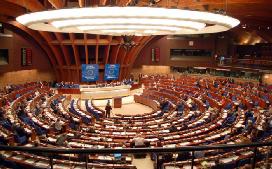Council of Europe Passes Resolution to Condemn the Crimes of Totalitarian Communist Regimes (Photo)
(Clearwisdom.net) On January 25, 2006, at its parliamentary assembly in Strasbourg, France, the Council of Europe passed a resolution condemning the crimes committed by totalitarian communist regimes. The Council of Europe emphasized that the resolution has practical application.

The Council of Europe passes resolution to condemn the crimes of totalitarian communist regimes
According to a VOA report on January 27, 2006, The Council of Europe Parliamentary Assembly (PACE), which brings together parliamentarians from 46 European countries, passed a resolution that for the first time strongly condemns the crimes committed by totalitarian communist regimes. This condemnation by Europe against crimes committed by totalitarian regimes is similar to the strong condemnation of the Nazi regime [at Nuremburg] a half-century ago.
The resolution urges former Eastern European communist countries to modify their textbooks and to build monuments for victims of the totalitarian communist regimes.
The resolution was adopted as a result of a report on "The Need for International Condemnation of the Crimes of Totalitarian Communist Regimes" authored by G ran Lindblad, a member of the Swedish parliamentary delegation to the Council of Europe.
Report lists crimes of totalitarian communist regimes
The report listed the crimes committed by the totalitarian communist regimes, and points out that the communist dictatorships have been characterized by massive violation of human rights since the very beginning. In order to achieve and maintain power, the communist regimes have gone beyond individual assassinations and local massacres, and have integrated criminal activities into the ruling system. When the need arose, the communist regimes have resorted to terror to maintain their power, as illustrated by Czechoslovakia in 1968, Poland in 1971, 1976 and 1981 or China in 1989.
The Council of Europe pointed out in its resolution that the crimes committed by totalitarian communist regimes have differed depending on the culture, country and the historical period, and have included individual and collective assassinations and executions, death in concentration camps, starvation, deportations, torture, slave labor, persecution against ethic minorities and religious believers, deprivation of freedom of belief, thought, speech and press and other crimes.
Victims in China exceed the total of all other countries
According to conservative estimates, the number of victims under the totalitarian communist regimes split up by country or regions stands as follows: The Soviet Union: 20 million victims, China: 65 million, Vietnam: 1 million, North Korea: 2 million, Cambodia: 2 million, Eastern Europe: 1 million, Latin America: 150,000, Africa: 1.7 million, Afghanistan: 1.5 million.
The report points out that it has been 15 years since the collapse of the Soviet Union and the end of the cold war, and the exposure of numerous archives illustrates that there is no essential difference between communism and Nazism. Both ideologies proclaim the establishment of a "perfect" society and the need to sweep away all obstacles. Both totalitarian regimes adopt similar means to maintain their power, for example, organizing youth groups, carrying on ideological propaganda in schools, implementing military control in society, cult worship of leaders, deprivation of freedom of speech and persecution with every conceivable method against their opponents.
The author of the report, G ran Lindblad, specifically mentioned the social characteristics of totalitarian regimes in his speech during the debate on the resolution at PACE. He said that under totalitarian regimes, individual rights and values do not exist. If we were presently in a totalitarian society, the debate today would be impossible. All societies under totalitarian regimes exist in terror. In such societies, individuals cannot freely express their thoughts, because they know they will be punished if they do so.
Condemnation of the crimes of totalitarian regimes has practical meaning
The resolution condemning the crimes of totalitarian regimes passed at PACE especially emphasized its practical significance, because "the communist regimes are still active in some countries of the world, and the crimes committed under these regimes continue to take place."
G ran Lindblad said that we can see similar phenomena in today's China, which is under a totalitarian communist regime. The regime is adopting severe methods to deal with dissidents, such as Falun Gong practitioners or religious people.
G ran Lindblad expressed that when more and more people become opponents of the regime, when the group of political dissidents becomes larger, this indicates that the resistance against the regime is becoming strong. This is a good phenomenon.
Thorough retrospection of the crimes of totalitarian communist regimes
As this year marks the 15th anniversary of the collapse of the Eastern European totalitarian communist regimes, the Council of Europe believes it is a good opportunity to make a thorough retrospection of the crimes of totalitarian communist regimes. Prior to this, the international community has never made a collective, thorough retrospection and investigated the crimes committed in the name of class struggle and proletarian dictatorship, nor has the international community made a public condemnation of the crimes of the totalitarian communist regimes as it did with respect to the Nazi's crimes. As a result, the general public does not have sufficient understanding of these crimes, and some communist parties that have not yet examined their crimes in history are still legal in some countries.
The Council of Europe believes that reviewing history is the prerequisite to preventing history from repeating itself, and public condemnation is a reference for communist parties in post-communist times. The resolution calls for extending moral restitution for the sufferings of victims of communist regimes and their families. It also calls for the former Eastern European countries to modify their textbooks and build monuments for victims of the totalitarian communist regimes.